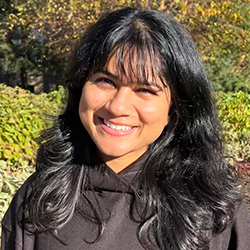PhD Student Payal Mohapatra Selected for EECS Rising Stars Workshop
Payal Mohapatra, a PhD candidate in computer engineering, was one of 70 invited participants in the intensive workshop designed for graduate students and postdocs of historically marginalized or underrepresented genders
Northwestern Engineering’s Payal Mohapatra attended the Electrical Engineering and Computer Science (EECS) Rising Stars Workshop 2024, hosted last month by MIT.
Launched in 2012, EECS Rising Stars is an intensive annual workshop for graduate students and postdocs of historically marginalized or underrepresented genders who are interested in pursuing academic careers in electrical engineering and computer science. Mohapatra was among the 70 invited participants out of 370 applicants.

Using methods inspired by machine learning, signal processing, and embedded systems, Mohapatra designs algorithms for real-world, human-centric applications, with a focus on healthcare, continuous sensing, and audio domains. She has built data modeling frameworks to predict fatigue in manufacturing workers and detect speech disfluency. During an internship this summer at Meta Reality Labs, Mohapatra worked on non-visual, sensing-based human behavior modeling in the context of seated conversations.
Mohapatra aims to tackle challenges related to the analytics of time series data in sensing and audio applications, which is often noisy and hard to interpret due to its complexity. She is currently developing computational methods to learn from evolving wearable sensing modalities, ensuring optimal performance with low latency while leveraging previously collected user data. Her goal is to design a unified deep-learning architecture capable of adapting to practical sensing scenarios, including varying conditions of stationarity, irregular sampling, and missing data due to sensor malfunctions or out-of-distribution data from sensor upgrades.
At the EECS Rising Stars workshop, Mohapatra connected with people working in brain-computer-interface and human-robot-interaction domains who have encountered the same challenges that her research aims to solve — namely, missing and corrupted data from certain sensors.
“Working with messy, real-world data to benchmark my algorithms can be frustrating, especially when compared to the cleaner datasets in fields like vision and language deep learning,” Mohapatra said. “These conversations renewed my enthusiasm, strengthening my commitment to developing research solutions and creating accessible resources and tutorials for practitioners across related fields looking to apply these methods.”
A member of the Design Automation of Intelligent Systems Lab, Mohapatra is advised by Qi Zhu, professor of electrical and computer engineering and (by courtesy) computer science at the McCormick School of Engineering. Prior to joining Northwestern, she was an integrated circuit design engineer at Analog Devices Inc. and earned a master’s degree in electrical engineering from the Indian Institute of Technology Madras.
The event’s networking and panels — which included discussions on the job search and negotiations, the experience of early-career faculty, and funding — inspired and encouraged Mohapatra.
“What struck me the most was the refreshingly honest take of the panelists on these topics,” Mohapatra said. “They discussed everything from changing career trajectories to understanding the unique physical demands faced by non-male researchers, and how these challenges can be managed by asking for the right kind of support. It was incredibly inspiring to hear the 'failure' stories from our role models, who generally seem to have it all. By sharing their journeys and showing vulnerability, they reminded us that failures are what make the path to success more interesting and worthwhile.”
Mohapatra was also motivated by advice from Zoya Bylinskii, a senior research scientist at Adobe Research, who used the metaphor of filling a vase to discuss the finiteness of time and the need to focus on priority tasks. Bylinskii explained that two big rocks (representing two main research projects) should go first, then smaller rocks (tasks like reviewing, organizing, side projects) can be added to the vase.
“If you let the small rocks lay the foundation in your fixed-sized vase, the big rocks won’t fit,” Mohapatra said. “We are often tempted to take on more tasks because, at the outset, they seem very exciting, and as researchers, we are innately curious. However, everything — no matter how small — takes non-zero time, and you unfortunately only have 24 hours a day.”
